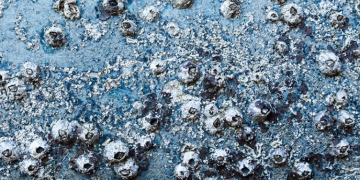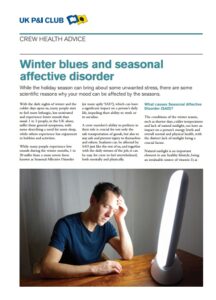The UK P&I Club recently focused on Seasonal Affective Disorder that could have a severe impact on seafarers’ health, as well as on maintaining safety onboard. Seafarers can be affected by SAD just like the rest of us, and together with the daily stresses of the job, it can be easy for crew to feel overwhelmed, both mentally and physically.
As explained, the disorder is related to the conditions of the winter season, with shorter days, colder temperatures and lack of natural sunlight, influencing a person’s energy levels and overall mental and physical health, with the distinct lack of sunlight being a crucial factor.
Natural sunlight is an important element in any healthy lifestyle, being an invaluable source of vitamin D, as well as affecting a person’s serotonin levels and internal body clock.
The Club notes the following signals of SAD:
- Greater need for sleep
- Agitation or anxiety
- A loss of pleasure or interest in normal everyday activities
- Persistent low mood
- Less energy / fatigue
- Trouble concentrating
- Increased appetite / weight gain
- Becoming less sociable
To minimise the effects of SAD, there are many changes that can be made:
- Try to get as much sunlight as possible during the day. If this is not possible, a ‘light box’ that emits light similar to that of the sun can be beneficial.
- Include more vitamin D in your diet by eating vitamin rich foods, such as fish, oranges and eggs.
- Try to exercise for 30 minutes a day.
- Where possible, try to avoid stressful situations, and take steps to manage your stress levels.
The Club also advises seafarers to keep up-to-date on health initiatives to monitor their own physical and mental health. The Sailors’ Society Wellness at Sea App, for example, provides interactive challenges on each of the five elements of Wellness at Sea training: Social, Emotional, Physical, Intellectual and Spiritual wellness.App users receive daily feedback, which enables them to monitor their progress. In addition, SeafarerHelp is the free, multi-lingual helpline for seafarers and their families, that can provide help 24 hours a day.
Explore more herebelow:




























































